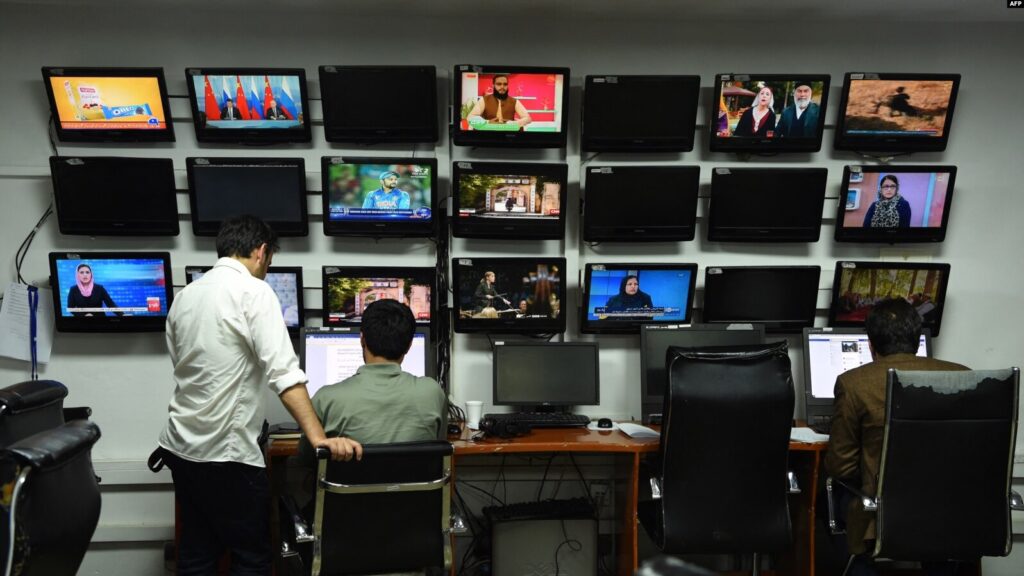Kabul (Feb 13 – Kubha News): Afghan journalists attribute the interference of Taliban government entities into the realm of free media affairs to the absence of clear legal guidelines. Investigative findings by Kubha News reveal interference by the General Directorate of Intelligence (GDI), the Ministry of Vice and Virtue, and the Provincial Directorates of the Information and Culture Ministry of the Taliban in shaping the content and media coverage of independent news outlets. Concerns are voiced by some journalists who fear that without legal safeguards, such interventions may escalate.
Following the overthrow of the republican government, the Taliban swiftly annulled the Afghan constitution and media laws safeguarding freedom of expression. While the Ministry of Information and Culture did not officially declare the repeal of the Public Media Law, it indicated an intent to implement a revised version. Journalists argue that the Taliban, in almost three years of rule, have failed to establish a functioning media law, leaving the press to operate in a legal void.
In interviews conducted with 12 journalists in Kabul and four central provinces, Kubha News uncovered that the GDI, the Ministry of Vice and Virtue, and the Provincial Information and Culture Directorates of the Taliban “assert themselves the authority to control and interfere in the affairs and even the content of the media.” These journalists, speaking anonymously, disclose instances of repeated interrogations related to their media coverage, with some colleagues being arrested and detained.
Former Pajhwok News Agency news manager Abbasin Zaheer contends that the Taliban, once proponents of a practical media law, now express the need for a new legislative framework. He emphasizes that both the access to information law and the mass media law are non-operational. He said “The current situation includes instances where non-media authorities, like the head of the passport department, react to reports, resulting in the interrogation of journalists. Previously, a legal authority existed to address media violations, but such mechanisms are now absent, leaving journalists vulnerable to arbitrary actions”.
Sami Jahish, an Afghan journalist, highlights that media laws were inadequately enforced during the republic years, but since the Taliban’s rise to power, numerous media outlets have collapsed due to security and economic challenges, prompting many journalists to flee the country. Jahish accuses the Taliban of failing to uphold press principles and attempting to exert control over the media.
While Reporters Without Borders labeled the situation of Afghan journalists and press as worrisome in its annual report, the Taliban has not officially responded to these concerns.Effects of Interventions
In their initial year of governance, the Taliban introduced new principles affecting the media, outlined in 11 articles that restrict access to information and press coverage, according to journalists. A former member of the Tolo News editorial board, speaking anonymously, asserts that these principles have significantly curtailed the independence of free media, even barring journalists from covering public demonstrations.
Taher Sadid, a former reporter of Khurshid TV who left the country due to personal security concerns and censorship, states that the Taliban’s interference in the media has reached a point where journalists find it challenging to continue their reporting activities.
Hujjatullah Mujadidi, Head of the Afghan Independent Journalist Association, has reported that 8,000 out of 12,000 media workers in the country have lost their jobs. Exiled Afghan journalists are now found in significant numbers in Pakistan and Iran.
Impact on Media Content
Local media representatives confirmed to Kubha News that they have ceased broadcasting entertainment programs on the orders of the Taliban. This decision not only reduced broadcasting hours but also led to a decline in audience numbers and commercial advertisements.
Veteran journalist Mahmood Kochai observes that the content of Afghan media has diminished compared to previous years, attributing this decline to the intervention of ruling institutions compromising media independence. Kochi states, “The intervention of the ruling institutions has questioned the independence of the media, as there is a lot of news that can be broadcast, but journalists are not allowed to cover it.”
Baitullah Hamidi, a former professor at Kabul University and a researcher of Afghan media in America, asserts that the deliberate non-implementation of media laws by the Taliban is a strategic move. According to him, authoritarian governments intentionally dismantle laws and foundations to deny the existence of a particular phenomenon, and in this case, freedom of speech in Afghanistan has suffered a similar fate. Hamidi further elaborates, stating, “This approach benefits the Taliban in two ways: firstly, it compels journalists to self-censor, and secondly, it empowers their group by granting them the authority to interfere in media affairs.”
Despite the Ministry of Information and Culture’s announcement of an 11-person media violations commission in August last year, some independent members within the commission acknowledge a lack of clear procedures for addressing media issues. This absence of a well-defined process hampers efforts to mitigate Taliban interference in media content and coverage.
This report was written by the news team of Kubha News and edited by the editorial team.
